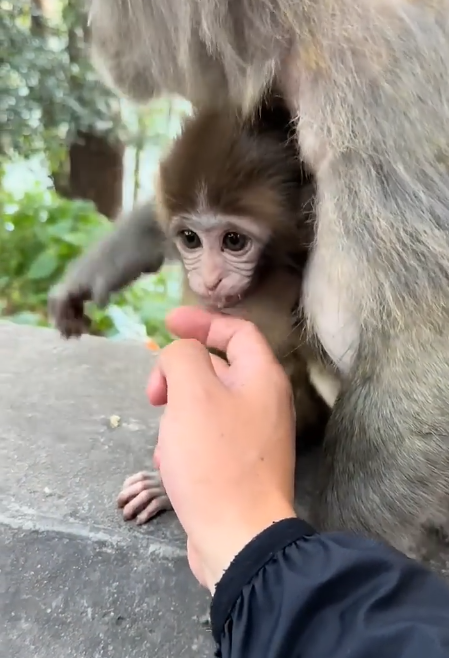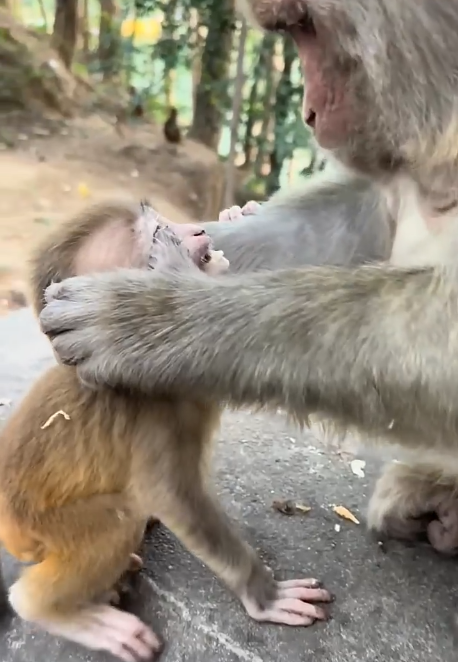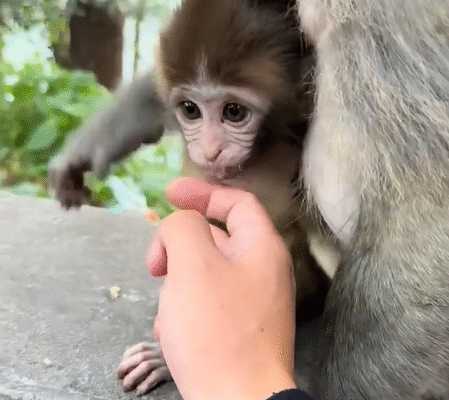
The jungle was alive with the sounds of birds chirping, leaves rustling, and the distant roar of a waterfall. Yet, in all this serenity, one small creature seemed determined to turn peace into chaos. Tiko, the tiny, mischievous little monkey, was wide awake, his dark, sparkling eyes scanning every tree, branch, and nook for the perfect opportunity to cause trouble. Everyone who knew Tiko—whether monkey or human—agreed on one thing: this little monkey was truly mischievous.
It all began at sunrise. Tiko’s mother, a gentle and patient macaque, had just settled down to groom herself and her young one. She expected a calm morning, perhaps some quiet playtime near their favorite fruit tree. But Tiko had other plans. Within seconds, he was off, scampering up a low-hanging branch and shaking it violently. Ripe bananas fell like golden raindrops, hitting the ground with soft thuds. The mother macaque sighed, resigned to the fact that her little one’s energy could not be contained. “Tiko,” she called, “come back here!”
Tiko, of course, ignored her. Instead, he spotted a squirrel nearby and, with a gleeful squeak, darted in its direction. The squirrel, startled, raced up a tree, while Tiko clumsily tried to follow, only to get stuck halfway and dangle upside down, legs flailing in the air. The scene was both alarming and hilarious—alarming because the little monkey could have hurt himself, hilarious because his wide-eyed panic was paired with a big, mischievous grin. Anyone watching would have laughed, even if they knew Tiko was completely unpredictable.
As the morning progressed, Tiko’s antics only grew bolder. He discovered a group of elder monkeys who were quietly enjoying some figs and decided that sharing was clearly overrated. One by one, he leaped from branch to branch, snatching figs from unsuspecting elders and retreating with them to a safe distance. He chattered triumphantly, waving a stolen fig in the air as if to say, “Try to catch me now!” The elder monkeys grumbled and shook their heads, familiar with Tiko’s playful but chaotic tendencies.
Tiko’s mischief was not limited to stealing food. He had a particular fascination with water, especially the small river that ran through the jungle. He would throw pebbles, splash at passing fish, and tease the riverbank birds, who squawked indignantly whenever he got too close. One time, he even tried to swing from a vine over the water, misjudged his grip, and landed with a dramatic splash, sending ripples across the surface. He emerged dripping but delighted, squealing with laughter as if nothing could dampen his spirits. Watching Tiko, it was impossible not to admire his fearless curiosity and uncontainable energy, even if it left the jungle in a constant state of mild chaos.

Perhaps the most astonishing part of Tiko’s mischievous nature was his cleverness. He was small, yes, but he seemed to understand the rules of his jungle world better than anyone else—rules that allowed him to bend them to his advantage. He figured out how to open coconuts by using rocks as hammers, observed how elder monkeys accessed hidden fruits, and even learned to manipulate simple traps set by humans for observational research. In every action, Tiko demonstrated not just curiosity, but intelligence, strategy, and a boundless sense of fun.
By midday, Tiko’s energy showed no signs of slowing down. He discovered a group of human researchers who were observing monkey behavior from a safe distance. At first, he watched them curiously, tilting his head and making soft squeaks. Then, with a sudden burst of daring, he leaped onto the edge of their equipment bag, scattering notebooks, pens, and fruit snacks in every direction. The humans gasped, some laughing nervously, as Tiko made a rapid retreat into the trees, holding a half-eaten banana like a trophy. “Truly mischievous,” one of them muttered, shaking their head. It was impossible not to agree.
Even his playful pranks among fellow monkeys were legendary. During group grooming sessions, Tiko often decided that subtle disruption was far more entertaining than sitting quietly. He would pull on tails, tickle the backs of sleeping elders, or toss small stones just out of reach, eliciting squeaks of surprise and laughter. Other young monkeys would try to copy him, but none could match his combination of audacity and cleverness. Tiko was the ringleader, the instigator, the small whirlwind of energy that kept everyone alert.
As evening approached, Tiko’s antics shifted from chaos to curiosity. The jungle began to glow in the golden light of sunset, and the baby monkey wandered into a clearing where flowers of every color swayed in the gentle breeze. For a brief moment, he paused, sniffed a blossom, and sat quietly, a small smile spreading across his face. Even mischievous monkeys need moments of peace, and this was Tiko’s—a fleeting pause before he returned to his endless exploration. It was in these small moments that his charm shone through: a reminder that his mischief was paired with innocence, curiosity, and a joy for life that was utterly infectious.

By nightfall, Tiko was exhausted, though still not fully tamed. He curled up in the crook of a tree, his mother close by, grooming him as he yawned and blinked sleepily. Even in rest, his little tail twitched now and then, as if dreaming of the next day’s adventures. Anyone observing could tell that tomorrow would bring another round of daring climbs, clever thefts, and chaotic play. The jungle would wake to his squeaks and laughter again, and nothing would ever be quite as calm as it might hope.
Tiko’s story—one day in the life of a truly mischievous little monkey—is not just a tale of chaos and laughter. It’s a story of curiosity, intelligence, and the pure joy of exploration. He reminds us that sometimes the smallest creatures can have the biggest impact on those around them, turning ordinary moments into stories of hilarity and wonder. The jungle, in all its grandeur, exists in harmony with Tiko’s playful spirit, each tree, branch, and river bend providing a stage for his antics.
In the end, what makes Tiko so memorable is not just the trouble he causes, but the joy and energy he brings. He is mischievous, yes, but he is also endlessly curious, clever, and full of life. His antics make those who observe him laugh, marvel, and sometimes shake their heads in disbelief, but ultimately, he leaves everyone with a sense of wonder at the playful spirit of the animal world.
This little monkey demonstrates a truth that is easy to forget in human life: mischief, curiosity, and play are vital parts of existence. Tiko teaches patience, laughter, and the ability to appreciate the small, chaotic, and unexpected moments. In a world often too serious, a mischievous little monkey like Tiko reminds us to smile, to explore, and to find joy in the everyday.
And so, as the jungle settled into the quiet of night, Tiko slept—dreaming of the next day’s adventure, the next stolen fruit, the next playful prank. Tomorrow, the forest would once again echo with the squeaks and laughter of this truly mischievous little monkey, and the world would be richer for it.



